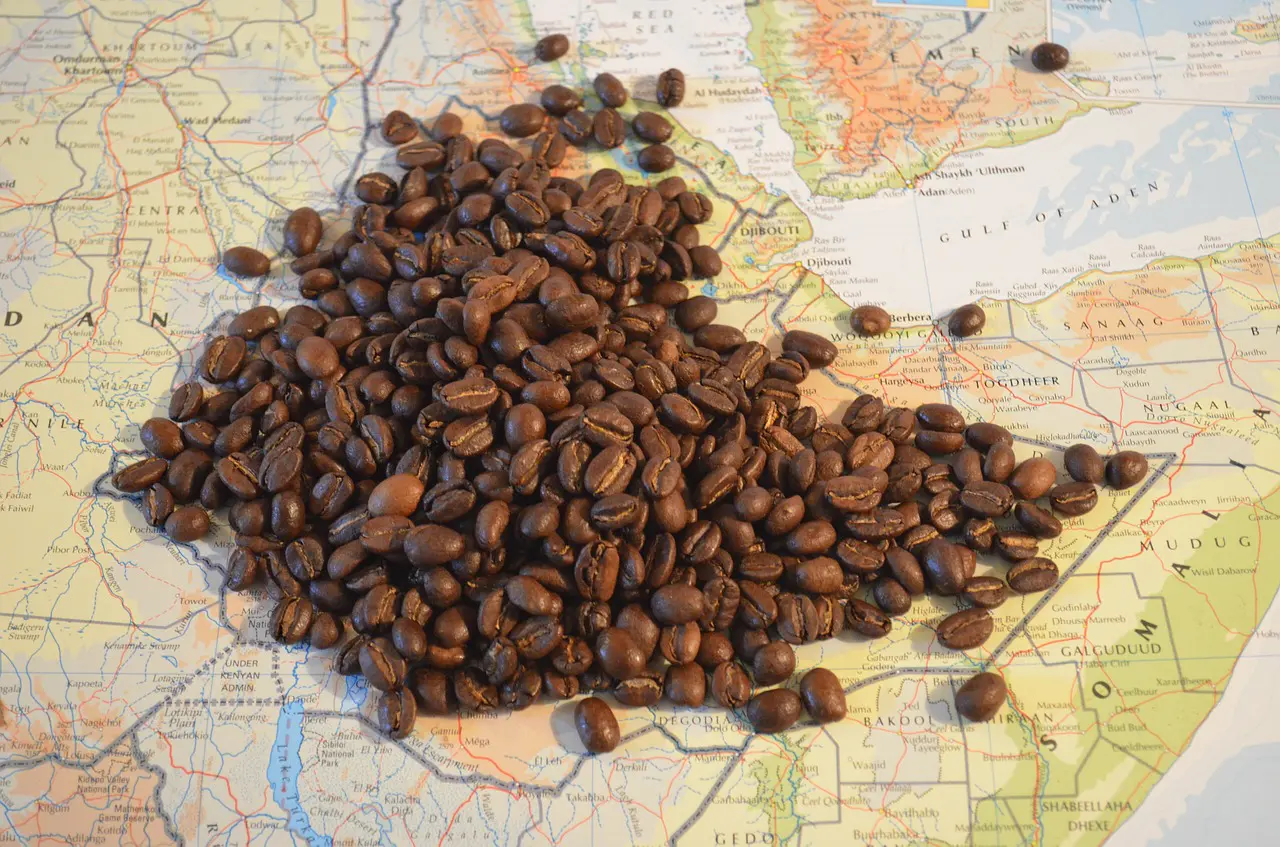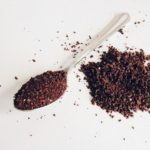Anyone who has listened to stories from relatives who were around during World War Two and who lived through rationing will probably have heard about making coffee from acorns. Did you know, however, that in some countries, mushrooms were also used? Four Sigmatics founder Tero Isokauppila has mentioned, for instance, that mushrooms were used to make coffee during World War Two in his native Finland.
So, did you know that mushroom coffee is now a “thing”? There’s been quite a buzz about it in the last few months, with it hitting mainstream stockists like Amazon and Whole Foods in a big way. You don’t make coffee from ground mushrooms in quite the same way that you would with acorns, however.
What Is Mushroom Coffee?
Well, first of all, you can’t really make mushroom coffee with any old common-or-garden mushroom. They need to be medicinal. And we’re not really suggesting that you go off and pick your own. (And don’t worry, when we say “medicinal”, we’re not talking about “magic mushrooms” or anything even resembling Fly Agaric here.)
You probably already know that there are hundreds of different species of mushrooms, some of which are perfectly safe to ingest and some of which, well, aren’t. Many of the course leaders for the foraging days which have sprung up pretty much everywhere will go into this in great depth and there are some great illustrated guide books around.
Why put yourself out, though, when you can find mushroom coffee Amazon mixes and blends ready-made? Be on the lookout for reishi mushroom coffee, Chaga mushroom coffee, lion’s mane mushroom coffee, and simply mushroom coffee. And if you’re wondering which brands or manufacturers to search out, then in the USA, you could do worse than start with Tim Ferris mushroom coffee.
Mushroom Coffee Variety
Back to the plot. Or rather, the coffee pot. The variety of mushroom that is used in mushroom coffee is specialized but pretty broad. Rather than the generally familiar terms like button mushrooms, morel, oyster and shitake, you’re more likely to see reishi, Chaga, cordyceps and lion’s mane listed on the packaging of your mushroom coffee.
So far, there have been frequent sightings of mushroom coffee in Finland (for obvious reasons) and, in America, places like Venice Beach, but mushroom coffee is starting to emerge in many other locations too. Four Sigmatic is one of the market leaders, with its specially formulated mushroom coffee mix. They use Chaga mushrooms extensively, and a variety that has been shown to even have an effect on cancerous cells.
Why Mushroom Coffee?
For mushroom coffee, the powdered medicinal mushrooms are an addition to the coffee bean base. Yes; in its most basic form, mushroom coffee is black coffee, with mushroom extracts added. When you think about it, coffee actually makes a great base for so many recipes, so it’s not really all that surprising to find the two ingredients teaming up.
We’re all very accustomed to adding cream, sugar, syrups, and other ingredients, after all. In recent years ingredients like butter have taken the coffee world by storm, so why not add mushrooms? It makes sense, when you think about it. And besides, mushrooms are typically a great source of protein as well as antioxidants and they’re packed with essential B vitamins.
If you’re still not convinced that mushrooms and coffee are a good pairing, then you might be reassured to know that the Finns drink more coffee per capita than anyone else in the world. That’s right: on average, every Finn drinks around 12kg of coffee every year. In case you’re wondering how that relates to the USA, it’s around three times the average per capita consumption of coffee in the United States.
What Does Mushroom Coffee Taste Like?
As you’d expect, the taste of your mushroom coffee depends, to some extent, on what mushroom extracts are used, as well as on the type of beans used to brew your coffee in the first place. If Chaga mushrooms are used, then your coffee will have quite a tree-bark like flavor, and the texture of your drink will be relatively woody too. Chaga mushrooms typically grow on birch trees, in case you were wondering.
Essentially, the key factor is that mushroom coffee doesn’t taste like mushrooms. And if you’re not a fan of coffee or you just want a change of beverage, there are even tea or hot chocolate options. For these kinds of relaxing beverages, it’s usually a type of reishi mushroom that’s used.
Is Mushroom Coffee Good For You?
Well, the jury’s still out overall on this one. The FDA has, however, cautiously allowed some US companies to state that mushroom coffee supports general health, has antioxidant properties, and can help to support the immune system. So on balance, yes, mushroom coffee is good for you. We need to stress, though, that the research is in its infancy at present and as yet, few human studies have been carried out.
Coffee, in general, is also good for you in other ways that might not be immediately obvious. It can also be used as a hair or facial rinse, helping restore radiance to your skin (though we’re sure it has a healthy glow in any case). It’s especially good for dark hair: wait until it’s cool, and use it just before your final rinse with cold water, it should really make your hair shine.
Mushroom Coffee Benefits
Well, apart from adding a great range of quirky flavors and textures to our favorite beverage, mushroom coffee benefits appear to be numerous. Some scientists and clinicians are starting to cautiously suggest that there’s quite a range of health conditions that can potentially be alleviated or even improved.
We’ve already mentioned cancer. There is, however, also some research that indicates these types of medicinal mushroom extracts may be beneficial for Alzheimers’ Disease amongst others. Researchers have quietly been investigating these aspects of these substances for at least ten years.
One of the other benefits of mushroom coffee is the lower caffeine level. Coffee made with the Four Sigmatic coffee mix, for instance, has around half the caffeine content of many coffee blends, so you get all the stimulating benefits of coffee with a lower risk of “jitters”. So for everyday coffee drinkers, two of the major benefits are all the great effects of increased alertness that you get from caffeine, together with improved immune system response.
If you’re wondering how to describe these great new types of potential additions to your diet, you’ll sometimes hear them described as nutraceuticals. These are items with the benefits of pharmaceuticals, but delivered in a food or drink form, and frequently derived from natural ingredients. Oh, and while we’re on the subject of terminology, if you see “myco” anywhere in a list of ingredients or jargon, it’s fairly likely to mean mushroom.
Growing Mushrooms In Coffee Grounds
There’s another way in which coffee and mushrooms are linked (or can be). You probably already know that coffee grounds are a great fertilizer if you’re lucky enough to have a yard area where you can grow your own fruit, veggies or flowering plants.
In a world where we’re all having to think pretty seriously about the principles of reduce, reuse, repurpose and recycle, coffee grounds are a great way to encourage plants to grow. They can drastically improve the substrate and the subsequent yield – although growing mushrooms yourself is far more difficult than it looks.
Who Should Avoid Mushroom Coffee?
Well, anyone with a mushroom intolerance probably needs to tread a little carefully with this one. There are other contraindications too: Chaga is a blood thinner, so if you’re taking blood-thinning drugs already, you’d be best to check with your healthcare professionals on whether mushroom coffee is safe for you. The same applies if you’re on diabetes medication.

When you’re buying mushroom coffee mixes, also check out the other ingredients just in case there are any that might potentially cause a reaction. The Four Sigmatic mushroom coffee mix, for instance, also contains a small amount of the herb Rhodiola. Like Chaga mushrooms, Rhodiola has been used in folk medicine in many countries for centuries, but modern scientific research into its effects is, as yet, somewhat lacking.
Should I Really Be Drinking Mushroom Coffee?
On balance, assuming you don’t have an intolerance or allergy to any of the ingredients, mushroom coffee is a great addition to your coffee repertoire. Of course, as with everything we eat, drink and otherwise consume, further research is being carried out all the time, so it’s likely we’ll see further developments, and hopefully, more proof of the benefits of mushroom coffee in the near future.
So, assuming we’ve brewed up a pot or a cup of Joe made just how we like it, let’s clink our mugs of mushroom coffee together and be very thankful to those who’ve revived some of the incredibly resourceful attitudes from the past. So let’s raise our mugs and say a hearty “Cheers!” to mycologists, coffee scientists and coffee drinkers everywhere.

Hi my name is Larry, a coffee aficionado from the US. I have already visited Colombia, Sumatra, Guatemala, Costa Rica, Ethiopia and Jamaica in my pursuit of finding the best-tasting coffee beans. I currently write from Bali and enjoy the relaxed life that you can only find in Canggu. Welcome to my coffee world!





